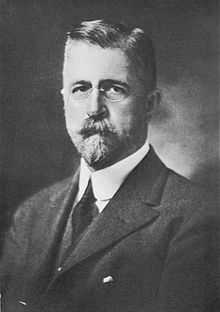Homer Hulbert
| Homer B. Hulbert | |
|---|---|
 | |
| Born |
January 26, 1863 New Haven, VT, USA |
| Died |
August 5, 1949 Seoul, South Korea |
| Nationality | American |
Homer Bezaleel Hulbert (1863–1949) was an American missionary, journalist and political activist who advocated for the independence of Korea.
Biography
Hulbert was born in New Haven, Vermont, in 1863 of Calvin and Mary Hulbert. His mother Mary Elizabeth Woodward Hulbert was a granddaughter of Mary Wheelock, daughter of Eleazar Wheelock, the founder of Dartmouth College. After graduating from Dartmouth, Hulbert attended Union Theological Seminary in 1884. He originally went to Korea in 1886 with two other instructors, Delzell A. Bunker and George W. Gilmore, to teach English at the Royal English School.[1] After the Japanese annexation began, he resigned his position as a teacher in the public middle school. He went as an emissary of the Korean King, protesting Japan's actions, to the United States in 1905 and 1906, and to the Hague in 1906 and 1907. His 1906 book, The Passing of Korea, criticized Japanese rule. He was not so much theoretically opposed to colonialism as he was concerned that modernization under the secular Japanese was inferior to a Christian-inspired modernization.[2] He was expelled by the Japanese governor-general of Korea on May 8, 1907.
Legacy
He was reported to have been a close personal friend of Emperor Kojong. One of his young middle school students just after the turn of the century was the first President of Korea, Syngman Rhee, who invited him back to Korea in 1948. It was on this trip that Hulbert developed pneumonia and died. Hulbert's tombstone reads “I would rather be buried in Korea than in Westminster Abbey.” He is interred at Yanghwajin Foreigners' Cemetery in Seoul.[3] He was the recipient of the Order of Merit for National Foundation by the Korean Government. He is occasionally referred to in Korean as a 독립유공자 ("contributor to independence").
Selected bibliography
| Wikisource has original works written by or about: |
- 1892 The Korean Repository (He was the editor of this monthly magazine)
- 1889 Knowledge Necessary for All
- 1903 Sign of the Jumna
- 1903 Search for a Siberian Klondike
- 1905 The History of Korea
- 1905 Comparative Grammar of Korean and Dravidian
- 1906 The Passing of Korea
- 1907 The Japanese in Korea: Extracts from the Korea Review
- 1925 Omjee - The Wizard
- 1926 The Face in the Mist
See also
- Royal English School (육영공원 Korean Wikipedia)
References
- ↑ Dynamic Korea: The American who loved Korea more than a Korean
- ↑ Andre Schmid, "Two Americans in Seoul, Evaluating an Oriental Empire, 1905-1910"
- ↑ JoongAng Daily: The journalist and missionary who defied Japan
External links
- The Hulbert Memorial Society
- "Homer Bezaleel Hulbert". Missionary, Journalist, Political Activist for Korean Independence. Find a Grave. Aug 19, 2011.
|